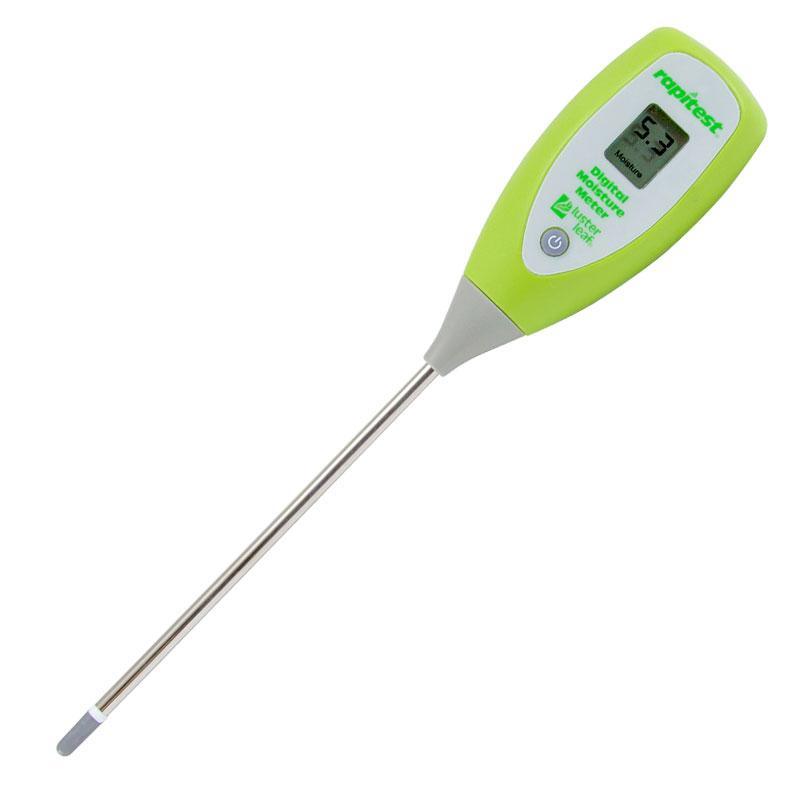The Ultimate Overview to Wetness Meters: A Comprehensive Introduction and Exactly How They Can Save You Cash
Moisture meters offer as crucial tools in identifying and keeping an eye on moisture web content in materials, aiding in stopping pricey problems and guaranteeing the high quality of items. Understanding the subtleties of various kinds of dampness meters, their applications, and the prospective cost-saving advantages they provide can be a game-changer for professionals and services alike.
Sorts Of Wetness Meters
One typical type is the pin-type wetness meter, which measures the electric resistance between 2 pins placed into a material. Pinless moisture meters, on the various other hand, use electromagnetic sensing unit plates to check a bigger location without creating damages to the material's surface.

Infrared moisture meters determine the thermal residential or commercial properties of a product to determine its wetness content non-invasively, making them valuable for applications where pin or pinless meters may not be appropriate. Recognizing the different kinds of wetness meters offered can help industries choose the most suitable device for their certain dampness measurement needs.

Advantages of Using Wetness Meters
Wetness meters use vital advantages in accurately assessing and keeping an eye on moisture levels in varied products and atmospheres. One of the primary benefits of making use of dampness meters is the avoidance of possible damage caused by excess dampness.
Moreover, utilizing dampness meters can lead to enhanced energy efficiency. In agricultural settings, dampness meters play a vital role in maximizing plant yields by making it possible for farmers to keep track of dirt moisture levels and make educated irrigation decisions.
Just How to Choose the Right Wetness Meter
Picking the suitable moisture meter includes considering essential variables such as material compatibility, measurement array, and calibration accuracy. When selecting a dampness meter, it's vital to make certain that the meter appropriates for the particular product you will certainly be testing. Various materials have varying electrical residential properties that can influence moisture readings, so picking a meter made for your material is essential for precise outcomes. In addition, take into consideration the measurement array of the dampness meter. Ensure that the meter can spot wetness levels within the variety needed for your applications. Calibration precision is one more critical element to bear in mind. Choose a wetness meter with trusted calibration to make certain consistent and precise readings. Some meters might call for routine calibration adjustments, so comprehending the calibration process is essential. By carefully evaluating these factors, you can pick a moisture meter that satisfies your needs and offers accurate moisture dimensions for your tasks.
Appropriate Techniques for Wetness Meter Usage

Expense Financial Savings Via Wetness Meter Applications
Just how can the calculated use of wetness meters lead to considerable cost financial savings throughout numerous sectors? In the farming sector, dampness meters aid in establishing the optimal time for harvesting plants, protecting against excess or over-drying wetness that can impact the last item's high quality.
Similarly, in construction, dampness meters assist prevent pricey damages by finding dampness levels in structure materials, such as wood or concrete, which can result in structural issues if not addressed promptly. By determining issue locations early, service providers can take rehabilitative actions to avoid substantial repair services or replacements, inevitably saving time and cash.
In addition, in the food handling market, dampness meters are necessary for monitoring product top quality and guaranteeing compliance with security laws. By properly measuring moisture material in food products, makers can avoid wasting, keep quality, and lower waste, leading to significant cost webpage financial savings. Overall, the critical application of moisture meters is an important financial investment that can result in substantial expense reductions and improved performance across various sectors.
Verdict
To conclude, moisture meters are important tools for determining and discovering dampness levels in Get More Information different materials. By making use of the best dampness meter and following proper techniques, customers can properly avoid pricey damages brought on by excess wetness. Buying a quality wetness meter can lead to considerable price financial savings in the future by identifying potential concerns beforehand and making it possible for punctual removal. Ultimately, dampness meters are important instruments for keeping the stability and durability of structures and products.
Dampness meters serve as vital devices in detecting and keeping an eye on moisture content in materials, helping in preventing pricey damages and ensuring the top quality of products. Infrared wetness meters measure the thermal residential or commercial properties of a product to identify its moisture material non-invasively, making them beneficial for applications where pin or pinless meters might not be appropriate.Dampness meters offer vital advantages in properly evaluating and keeping track of dampness levels in diverse products and settings. In farming setups, dampness meters play an essential role in enhancing plant yields by enabling farmers to keep track of dirt wetness levels and make notified watering click here to find out more decisions.In verdict, dampness meters are valuable tools for discovering and measuring dampness levels in different products.